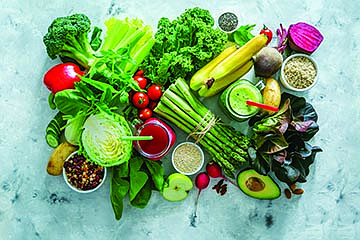Your digestive tract is teeming with bacteria - some good, some bad - and those microbes can seriously impact your health. The fact that microbes make up 99% of humans' DNA should give you an indication of how important they are to overall health, says Dr. Suzannah Bozzone, family and lifestyle medicine physician at The True Health Journey in Chattanooga.
Since the foods you consume are the primary factor affecting the diversity and health of the microbes in your gut, making dietary changes now can bring about a host of benefits, from reducing the risk of disease to preventing conditions such as diabetes and inflammation to improving your mood.
Despite diet being such a major player in one's health, most physicians aren't trained in nutrition because they're not reimbursed for it, Bozzone says. Doctors are focused on treating symptoms of poor gut health, such as prescribing medicine to prevent acid reflux, rather than addressing the root causes - which are dietary 80% of the time when it comes to chronic diseases such as diabetes, she says.
The gut is also a major player when it comes to your mental health. Considering 80% of serotonin is produced by the gut microbiome, "gut health is so important to your feeling of well-being," she says.
How do I know if my gut is unhealthy?
Although there are tests that claim to analyze the gut microbiome, they're not that well evidenced yet, says Bozzone. She points to digestive issues such as constipation and diarrhea as the main indicators of an unhealthy gut. But there are also symptoms not obviously linked to the gut - such as imbalanced hormones, getting sick often, not sleeping effectively and feeling sluggish after eating - that may indicate an unbalanced nervous system or poor digestion, because you're not getting the nutrients you need from food or aren't getting the relaxation necessary for digestion.
What about supplements?
When many people think about feeding the gut, they think of probiotic supplements. These have their place, says Bozzone, though she recommends people make dietary changes first.One supplement she does recommend for people switching to an entirely plant-based diet is vitamin B12, which is deficient in a vegan diet and also depleted by many medications. She suggests people have their level of this nutrient checked first, but even if you don’t, it’s fine to supplement because you can’t overdose on it, she says. Vitamin D3 is another that’s good to supplement, says Bozzone, as you can’t effectively get it from food.She also suggests incorporating ground flax into your diet as a potent source of fiber and omega-3. Try adding 1-2 tablespoons to a salad.
OK, so how do I increase good bacteria in my gut?
» Avoid highly processed foods. Instead, feed the gut microbiome what it wants to eat: a plant-based diet of fiber-rich whole foods.
If, like 97% of Americans, your diet is lacking in fiber, gut bacteria that would have been chowing down on that fiber will turn to the lining of your gut for food instead. The resulting breakdown of the stomach lining leads to what's known as leaky gut, in which bacteria and toxins from the gut permeate the intestinal wall. This can cause conditions from indigestion to inflammation and may even contribute to autoimmune conditions.
» Reduce the amount of animal products in your diet.
"The less meat that we eat, the better we do," Bozzone says. Processed meats including sausage, bacon and lunch meats are known carcinogens, and red meats are probable carcinogens, she explains.
When you do eat meat, make it more of a condiment rather than the centerpiece of your meal. Think beef stir-fry rather than steak with a side of potatoes.
Dairy is also detrimental to gut health, Bozzone says. For people with digestive issues, she recommends eliminating it from the diet altogether (as she's done herself). Get your calcium from dark, leafy greens instead.
» Make each meal a work of art by aiming for a rainbow of colors on your plate."Food should look beautiful to your eye," she says.
» Swap out highly processed carbs such as bread and chips for complex carbs like quinoa and barley.
Gut health game plan
1. Start by increasing whole vegetables and fruits in your diet. Begin with at least seven servings a day, working up to a goal of 10 per day. Note that smoothies can be a tasty way to incorporate fruits and veggies into your diet, but juices lack gut-healthy fiber.
2. Increase your intake of fiber. Your body needs 40 grams of fiber a day, but the average American only consumes 18 grams. Bozzone recommends gradually increasing your fiber intake by 5-gram increments. The increased fiber will help your gut go through its cycles more effectively, she says.
3. Eat fewer animal products and make beans your primary protein source. Try having "meatless Mondays," or make one meal a day a big salad without any animal products.
4. Avoid fried foods and processed "frankenfoods," even vegan ones like tofu dogs and some meatless burgers. If you look at the ingredients and don't recognize some, then pass.
5. Get rid of junk foods such as soda, candy and chips, replacing them with snacks like veggies and hummus.
6. Once you've made the switch to a plant-based, whole-food diet, start paying more attention to the timing of your meals. To allow time for the gut to heal, you want to fast for at least 12 hours between dinner and breakfast the next morning, and at least five hours between meals. Don't snack throughout the day, which will only drive your insulin up and make you feel hungry again. "Once you get the toxic foods out, it's easier to listen to your body's signals," Bozzone says.
7. Remember that all these dietary changes take time. "You're going to have some gas on the front end," she warns.
